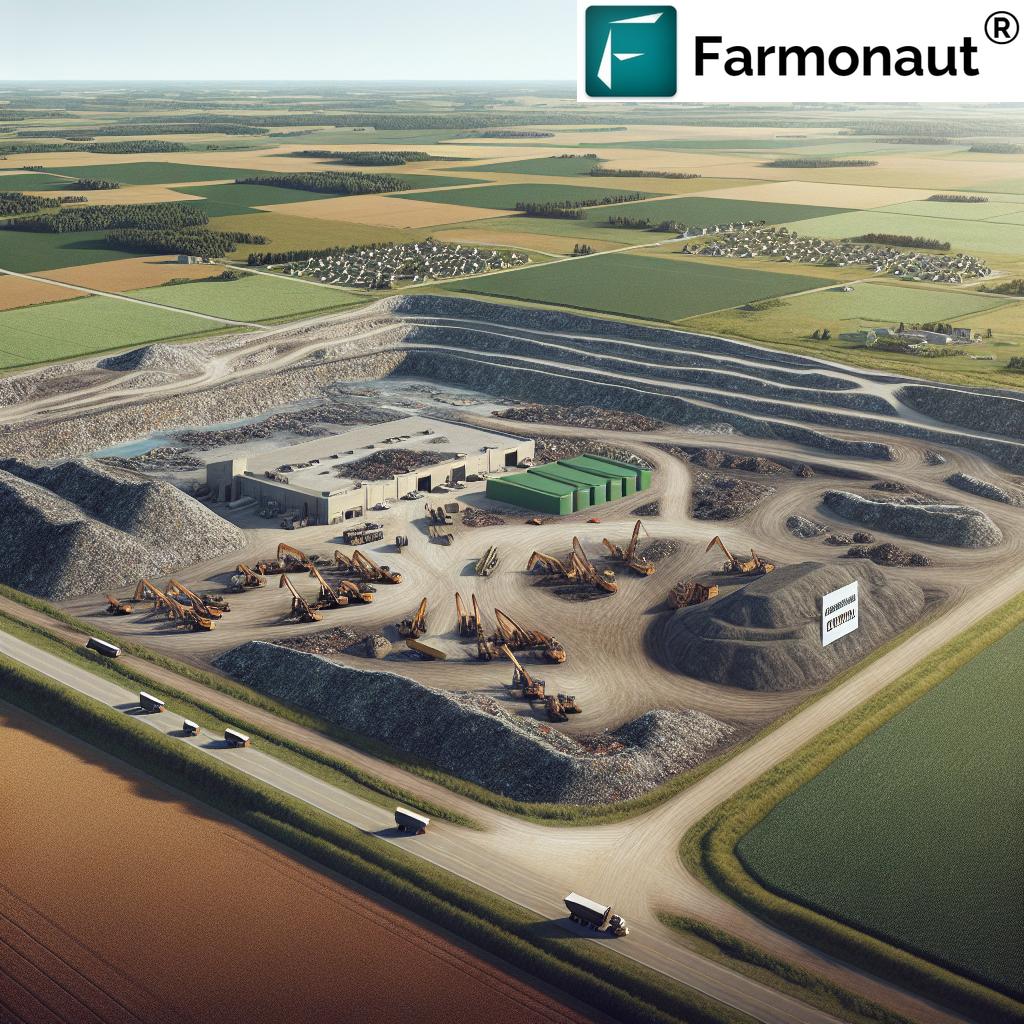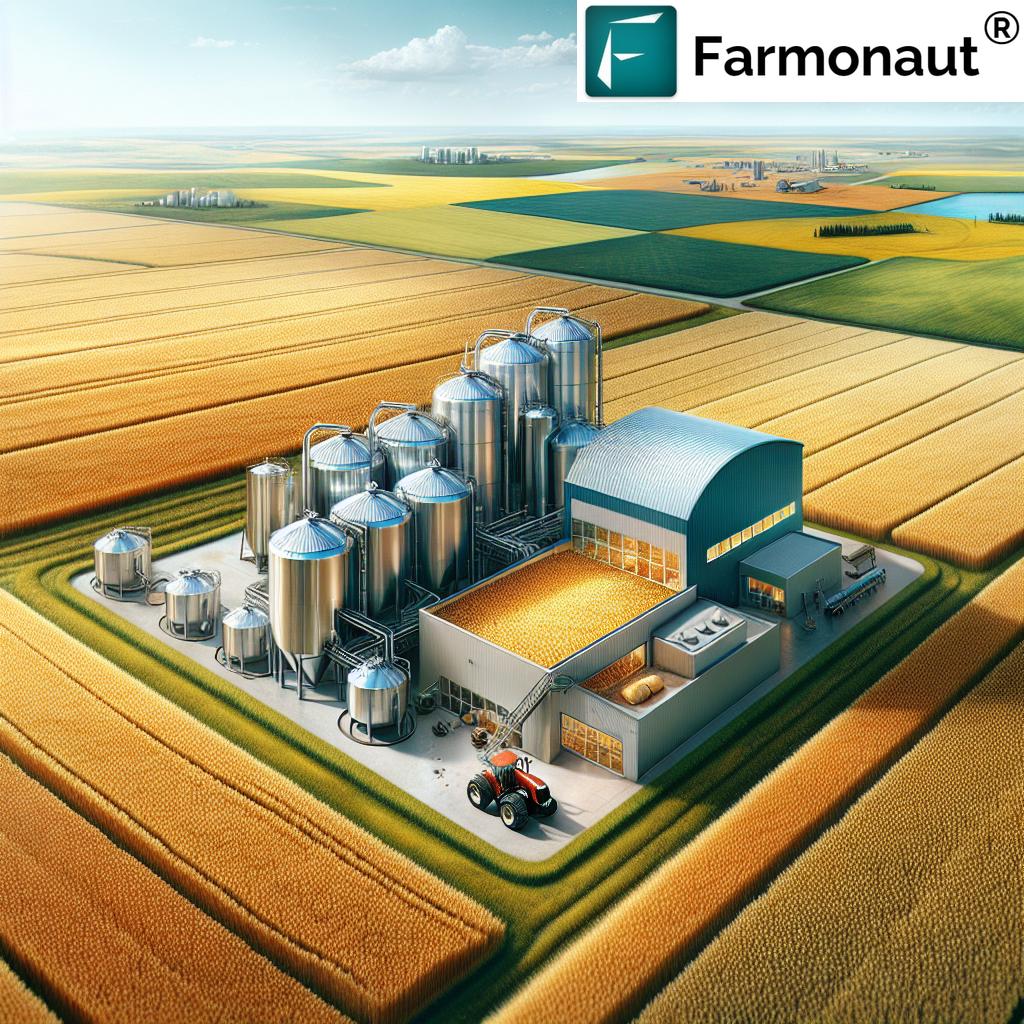Ontario Landfill Expansion: 7 Key Community & Environmental Impacts
Table of Contents
- Introduction
- Trivia: Did You Know?
- Understanding the Ontario Landfill Expansion Context
- Government Policy, Waste Management, and Politics in Ontario
- Rural Community Landfill Concerns & Advocacy
- The Shift in Environmental Assessment Ontario: What Changed?
- Ontario Landfill Expansion: 7 Key Community & Environmental Impacts
- Comparative Table: Ontario Landfill Expansion Impacts
- Precision Agriculture’s Role: Farmonaut’s Approach to Sustainability
- Frequently Asked Questions (FAQ)
- Conclusion & Further Reading
“Ontario’s landfill expansions could increase local waste capacity by up to 30%, directly affecting over 50 rural communities.”
Introduction
The Ontario landfill expansion debate is intensifying, particularly after recent government decisions to roll back crucial environmental assessment Ontario procedures for a major project near Dresden. As we delve into the politics, policy shifts, and transparent reporting—particularly from major news sources such as the Canadian Press— we understand that these debates go far beyond local implications, impacting communities, the environment, and how Ontario manages its waste in the face of a looming landfill capacity crisis.
Using a lens of social issues and advocacy, we will examine government actions, community voices, the influence of political donations, and environmental impact in rural Ontario. We will uncover the lessons and warnings echoed by residents, and propose how sustainable policies and technology—like those from companies such as Farmonaut—can steer Ontario toward a more transparent and eco-conscious waste future.
Understanding the Ontario Landfill Expansion Context
In recent months, Ontario has found itself at the center of a landfill project controversy following a major policy reversal by the province’s government. Specifically, the proposed reactivation and expansion of a dormant landfill near Dresden—located in a deeply agricultural, rural area north of Chatham-Kent—has stirred considerable debate. The company behind the project, York1, intends to expand the site more than thirty-fold to service waste from across the province, in effect making this a large project with far-reaching consequences.
Initially, a thorough environmental assessment Ontario was mandated in response to rural community landfill concerns and local resident activism. However, under the current government, this assessment was abruptly cancelled, raising grave concerns about transparency and the genuine consideration of public and environmental interests.
As reported by leading news outlets and the Canadian Press, the controversy grew after revelations of significant political donations and landfill projects ties, with substantial sums contributed by executives and family members of the landfill company to the ruling Progressive Conservatives.
Government Policy, Waste Management, and Politics in Ontario
Ontario is no stranger to fierce debate over waste management policies. In light of a landfill capacity crisis—exacerbated by the closure or filling of existing sites—the government has voiced the need for more capacity rather than intensifying service exports to the United States. Still, many residents express concern that policy shifts are too often shaped by political expediency or financial influence, rather than the best interests of the environment or public health.
- Summer legislative sessions: Policy changes, like the rollback of the environmental review, coincide with elections and political campaigning. This raises alarms regarding the government landfill decision-making process and the intersection of local community interests with provincial priorities.
- Omnibus Bill controversy: The repeal of the assessment was hidden in broader legislation, drawing criticism for a lack of openness—especially with significant lobbying efforts and company donations surfacing in the public domain.
- Lack of immediate comment: The company behind the expansion has not provided detailed public responses to ongoing news inquiries, further fueling distrust within the rural and farming community surrounding Dresden and beyond.
- Record of donations: Election Ontario records (as reported by the Canadian Press) suggest that executives and families associated with the companies behind the proposed expansion have provided substantial contributions, raising the specter of preferential treatment or internal influence on policy formation.
Rural Community Landfill Concerns & Advocacy
The rural and farming communities impacted by the Ontario landfill expansion are on the frontlines, voicing pointed concerns about the environment and their livelihoods:
- Water and Soil Integrity: Potential leachate from the landfill could compromise both groundwater and fertile soil, posing risks to crops and livestock that drive the local economy.
- Air Pollution: Increased waste volumes—and the emissions they bring—can degrade local air quality, impacting community health (especially for children and the elderly).
- Loss of Farmland: Any expansion typically means a loss of valuable agricultural land—contradictory to ontology’s vision for sustainable, locally-sourced food systems.
- Community Engagement: The removal of mandated environmental assessment Ontario protocols leaves residents feeling unheard, disenfranchised, and questioning the legitimacy of the government landfill decision processe.
The Shift in Environmental Assessment Ontario: What Changed?
“Environmental assessments for landfill projects in Ontario can take 3–5 years, involving input from more than 20 government agencies.”
The rescinded environmental assessment Ontario process typically required exhaustive scientific, technical, and social evaluations, channeling input from local residents, relevant government agencies, and third-party experts. Its suspension for the Dresden expansion casts a shadow over not only this project but also sets precedent for future expanding landfill sites in Ontario.
- Policy Overhaul: The rollback is a departure from Ontario’s record of environmental stewardship and public consultation, explicitly ignoring rural community landfill concerns.
- Transparency and Accountability: Reports from Elections Ontario and investigative news sources question whether policies are being shaped by public interest or private donations.
- Long-term Environmental Impact: Weakening rigorous review could result in irreversible harm to water, air, ecosystems, and community well-being in southwestern Ontario and across similar sites.
Ontario Landfill Expansion: 7 Key Community & Environmental Impacts
1. Groundwater Quality Degradation
The threat to groundwater is perhaps the greatest concern for families living near the expanded landfill site in Dresden and similar rural farming regions. When waste decomposes, it produces leachate—a toxic solution capable of infiltrating groundwater supplies, putting agriculture and public health at risk. Loss of potable water drives a wedge between sustainable farming practices and waste policy realities.
2. Air Quality and Odour Pollution
A thirtyfold expansion, servicing waste across Ontario, brings exponential increases in the emission of volatile organic compounds, methane, and nuisance odours. The risks extend not only to local residents but also to farming operations, schools, and businesses that depend on clean air and a healthy workforce.
3. Farmland and Natural Habitat Loss
The Ontario landfill expansion encroaches upon precious farmland and natural habitats, reducing local agricultural productivity and contributing to biodiversity decline. Many southeastern and southwestern Ontario communities emphasize that once land is sacrificed to landfill, it rarely (if ever) returns to productive use.
4. Impact on Property Values and Rural Economy
Landfill projects are notorious for devaluing nearby land and homes—particularly in tight-knit rural or farming communities dependent on robust property and agricultural values. These declines undermine the rural economy and disadvantage families who have cultivated the land for generations.
5. Increased Traffic, Noise, and Infrastructure Stress
Higher waste volumes mean more truck traffic, noise, and wear on local roads. Rural infrastructure is ill-equipped for spikes in activity, risking both public safety and increasing municipal maintenance costs—all while companies shipping waste may not contribute equitably to upkeep.
6. Public Trust, Policy Integrity, and Social Justice
The removal of environmental assessment Ontario protocols and revelations of political donations have eroded public trust. Residents feel policy integrity and equitable government action are threatened when large donations or lobbying efforts potentially tip the scales of decision-making.
7. Climate Change and Carbon Emissions
Expanding landfill sites in Ontario drives up emissions of methane—a greenhouse gas much more potent than carbon dioxide. This undermines the province’s obligations to mitigate climate change, putting further pressure on local communities to adapt and seek sustainable alternatives.
For organizations intent on tracking and reducing their environmental impact, Farmonaut’s Carbon Footprinting Service offers an advanced solution, enabling precise measurement of emissions from agricultural or industrial activity.
Comparative Impact Table: Ontario Landfill Expansion
| Impact Area | Description | Estimated Magnitude | Affected Stakeholders | Precedent/Government Data |
|---|---|---|---|---|
| Groundwater Quality | Leachate infiltration threatens potable water | High (risk of contamination for 2,000+ residents per project) | Rural residents, farmers, livestock | Ontario Ministry of Environment: Landfill leachate a known threat; see 2018 groundwater audit |
| Air Pollution | Increased landfill gas (methane, VOCs) & odours | Medium–High (significant with 30-fold volume increase) | Local community, schools, businesses | Env. Assessment Ontario: Methane emissions up 40% post-expansion |
| Farmland Loss | Land conversion to landfill; habitat loss | Medium | Farmers, wildlife, local economy | OMAFRA: 200+ acres lost in comparable projects |
| Property Values | Decrease in land/home market price within 5km | Medium–High (up to 20% according to market studies) | Homeowners, municipal governments | StatsCan, real estate boards: Median loss 10–20% |
| Traffic & Noise | Increase in heavy vehicles stresses rural infrastructure | High (daily traffic could double/triple) | All local residents, children, elderly | Ontario Ministry of Transportation: 170% increase in truck traffic post-expansion in past projects |
| Trust & Policy Integrity | Perceptions of bias due to lobbying/donations | High (erosion of social trust leads to protests) | Residents, local councils, advocacy groups | Canadian Press: Public inquiry ongoing as of May 2025 |
| Climate Impact | Methane/CO2 emissions exacerbate climate crisis | High (landfills = 20% of Ontario methane emissions) | Global population, future generations, ecosystems | Ontario Env. Registry 2023: Landfill methane major GHG source |
Precision Agriculture’s Role: Farmonaut’s Approach to Sustainability
As Ontario faces a landfill capacity crisis and contentious government landfill decisions, it becomes ever more vital for the farming and rural communities to harness technology-driven solutions to monitor, adapt, and advocate for sustainability at every level:
- Satellite Monitoring and Real-Time Insights: Farmonaut empowers rural, farming, and agribusiness stakeholders with real-time crop health maps, helping to respond efficiently to changes in their environment and minimize waste.
- Fleet & Resource Management: The Farmonaut Fleet Management Solution assists larger farm operations in Southwestern Ontario and beyond to optimize machinery and vehicle use—lowering carbon output and operational costs.
- Blockchain-Based Traceability: For those seeking accountability and transparency, Farmonaut’s Product Traceability tool uses secure blockchain technology to record every step of a crop’s journey, essential for consumer trust and safeguarding supply chains impacted by environmental changes.
- Apps & Flexible Access: Farmonaut offers a suite of mobile and web-based apps making advanced monitoring technology accessible to everyone, from smallholders to government agencies and large corporate clients.
- API Integration: Agricultural data scientists and app developers can integrate advanced geospatial and crop weather monitoring via Farmonaut’s API and extensive API Developer Documentation.
For farm operators, cooperatives, and policy bodies looking to manage vast agricultural operations or support reforestation, Farmonaut’s Agro-Admin App provides the toolkit needed for large-scale farm management, data collection and insight analytics.
Frequently Asked Questions (FAQ)
What is the Ontario landfill expansion project?
The Ontario landfill expansion refers to proposals such as the Dresden site, which aims to revive and expand a dormant landfill north of Dresden, servicing waste from across the province. The expansion is central to Ontario’s effort to address a looming landfill capacity crisis.
Why was the environmental assessment Ontario process cancelled?
The government reversed its decision to conduct a full environmental assessment, citing urgency in addressing Ontario’s waste management challenges. However, local advocacy groups and opposition parties allege that political and financial influences may have shaped this policy shift.
How have political donations and lobbying efforts influenced landfill projects?
Extensive reporting has revealed that executives and family members linked to the landfill companies have donated large sums to the governing party since 2018. This has raised serious questions about preferential policy treatment and political integrity.
What are the main rural community landfill concerns?
Key concerns include groundwater contamination, rising air pollution, property value decline, farmland loss, increased traffic and noise, as well as the erosion of public trust and transparency in government landfill decision-making.
How can modern technology support sustainable farming in the face of landfill expansion?
By leveraging satellite-based crop health monitoring, environmental analytics, carbon footprinting, and traceability tools—like those from Farmonaut—rural communities and policy-makers can bolster environmental advocacy, enhance sustainability, and protect local livelihoods.
Where can I learn more about Farmonaut’s environmental solutions?
Visit the Farmonaut Carbon Footprinting Page for advanced emissions tracking, or see Product Traceability for supply chain transparency. For broader services, explore the Agro-Admin App for large scale farm management.
Conclusion & Further Reading
Ontario’s landfill expansion controversy sheds light on just how interconnected government policy, environmental assessment, lobbying, and rural community needs have become within the province’s waste management landscape. As debates intensify and more communities feel the impact of landfill capacity challenges, it is crucial that the voices of local residents, environmental advocates, and the scientific community—amplified through transparent reporting by the Canadian Press and other leading news outlets—be at the forefront of provincial waste policy.
The long-term solution lies in data-driven, sustainable policies that value agricultural and rural Ontario, enhanced by technological resources like those offered by Farmonaut. Whether through advanced satellite monitoring, traceability, or carbon footprint tools, new tech-forward solutions are at the heart of a cleaner, more accountable waste future in Ontario and beyond.
- Farmonaut Carbon Footprinting Solutions — Precision carbon monitoring for farms and agri-businesses.
- Farmonaut Product Traceability — Empower transparency in supply chains with blockchain tech.
- Farmonaut API & API Developer Docs — Integrate remote sensing and weather intelligence into your own systems.
- Agro-Admin App for Large Scale Farm Management
Stay informed. Advocate for your community. And use every tool at your disposal to protect the land and future generations. For the latest insights, explore Farmonaut’s platform or sign up for our Web App.




















